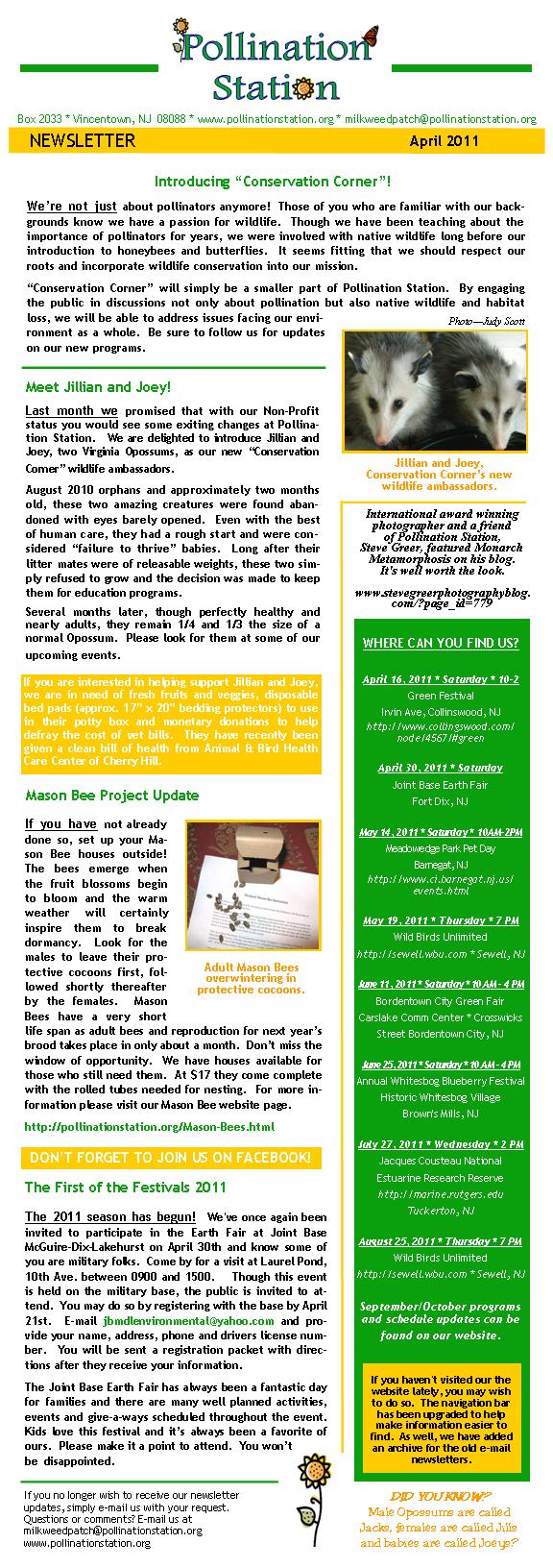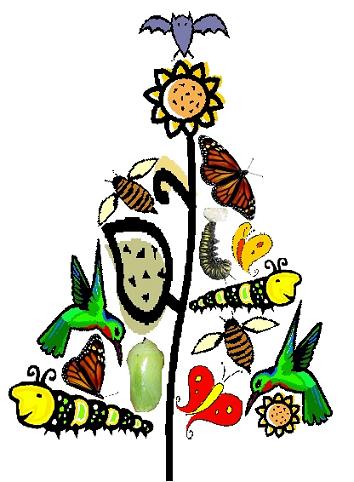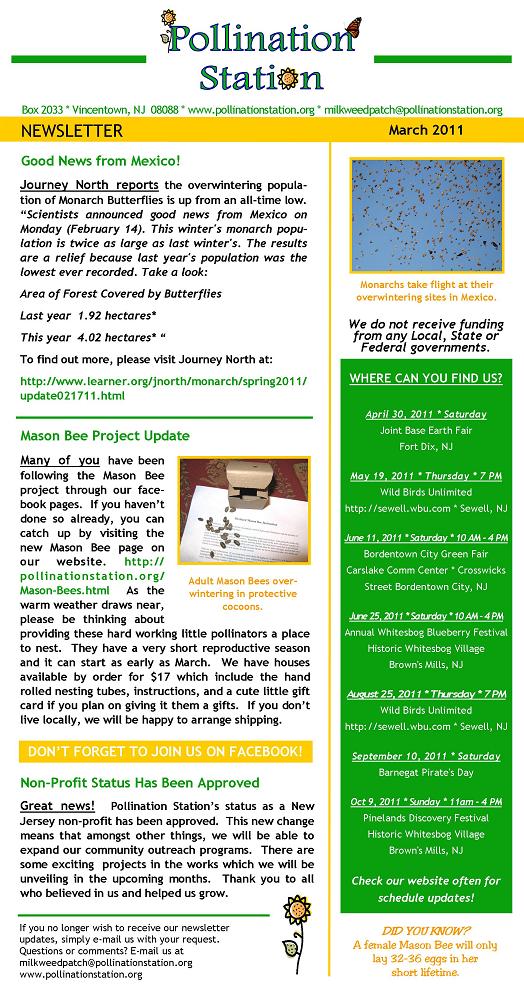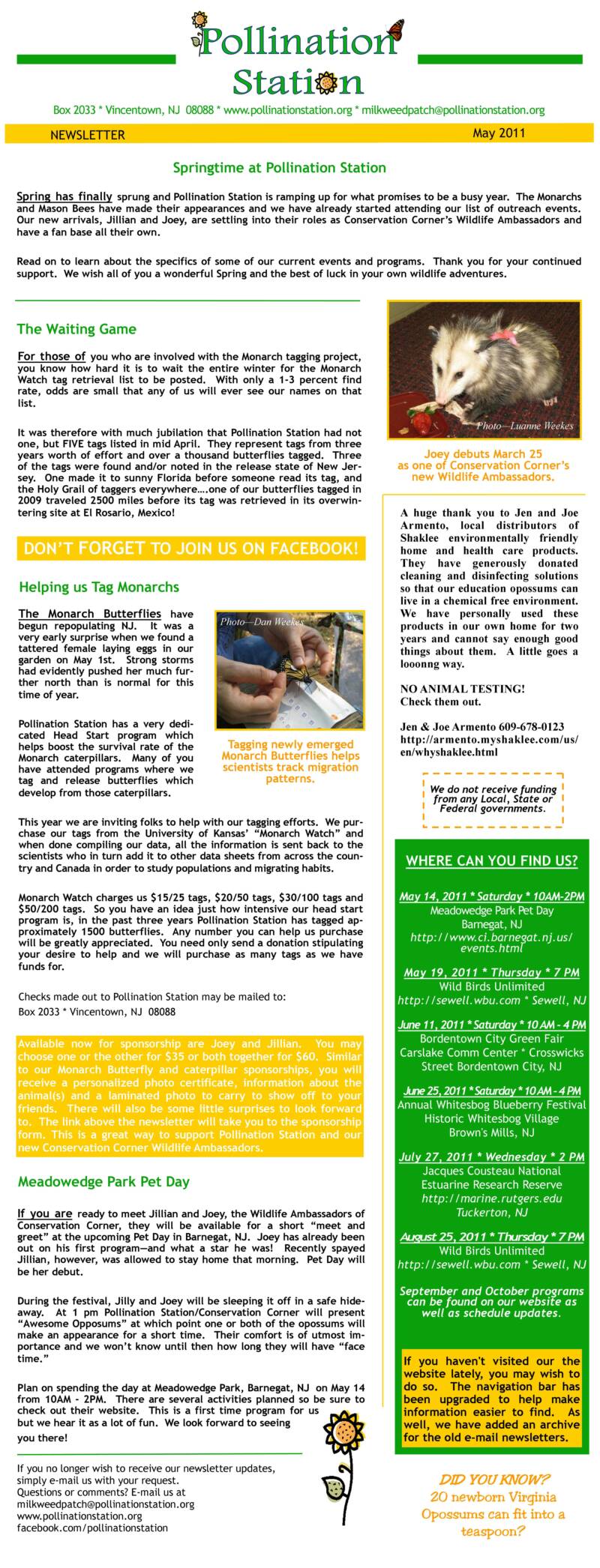
C
ARCHIVED NEWSLETTERS
Bee safe
Bee patient
Bee loving
Bee happy
Best 2011 New Year wishes from Pollination Station January 2011
A word about the Monarch Butterfly overwintering population from Erik Mollenhauer of Monarch Teacher Network. "As many of you know, there appeared to be a late summer "explosion" in the numbers of monarch butterflies in many parts of its range. That explosion translated into some spectacular scenes during the migration. At one point in September, observers estimated over 1 million monarchs passing by during a two hour period. A recent report via Chip Taylor at MonarchWatch is that early estimates of the Mexican monarch colonies look good. The numbers appear to be much larger than last year's record low of 1.92 hectares (a hectare is about 2.5 acres) of forest covered in orange. Chip's projection is that once the surveys are finalized and reported, this year's colony areas will be between 5-6 hectares. Keep your fingers crossed that this year there are no serious winter ice storms in January or February. Assuming there are none, this coming summer could be a great year for monarchs."
Though the current statistics look promising, don't let your guard down. It's more important than ever to focus on Monarch Butterfly conservation. Get involved by making sure your friends and neighbors are aware of the plight of the Monarch Butterfly. Plant your milkweed! Remember, milkweed is the ONLY plant on which a female Monarch will lay her eggs. They are the ONLY plants the Monarch Caterpillars will eat.
The Mason Bee project has begun. After a little research we ordered our MB which arrived in a dormant state mid Nov. In protective cocoons are fully formed adults waiting for warm weather to arrive. Currently in our refrigerator, we will set them out in little cardboard boxes near our Mason Bee house when the fruit trees start to bloom. It's a very different process from maintaining our honeybees.
Give Mason Bees a try!
Would you like to try your hand with Honeybees but are overwhelmed by the project or concerned with regulations in your neighborhood?
Many Reasons to Try Mason Bees!
Mason Bees...
1. are solitary. There is only one bee per nest, not thousands.
2. rarely sting.
3. are native to North America, whereas honeybees are not.
4. are early spring bees & emerge about the time cherries bloom.
5. fly as low as 54 degrees F. Honeybees fly at 57-59 degrees F.
6. forage earlier in the morning and later in the afternoon than honeybees.
7. use holes in wood or nesting tubes for a nest.
8. are low maintenance and require only a small bee house with a VERY low start up cost!
We made these adorable Mason Bee houses for a recent fund raiser and they sold out almost instantly! Dan agreed to make more for gift giving (or yourself) if anyone is interested. For $17, each house is hand crafted and includes the hand rolled (that's Luanne's job) nesting tubes, instructions and is decorated with a cheery to/from card. We can work out shipping arrangements if you don't live locally.
Pollination Station is anticipating a full schedule during the upcoming year. Our 2011 events calendar will be posted on the website's "Current News" page soon. Check it out and stop by to see us if we are in your neighborhood and don't forget to join us on facebook!
Dan and Luanne
Pollination Station
Box 2033 * Vincentown, NJ 08088
milkweedpatch@pollinationstation.org
www.pollinationstation.org
"Have you planted YOUR milkweed, yet?" }i{

 | ||||

